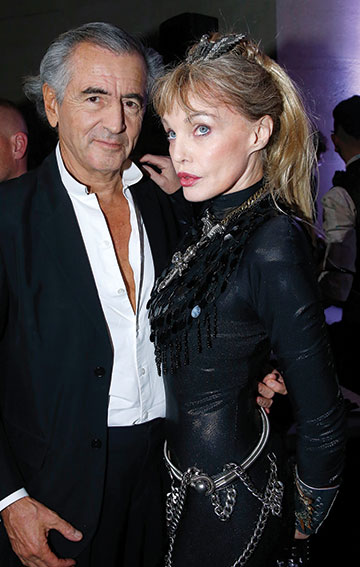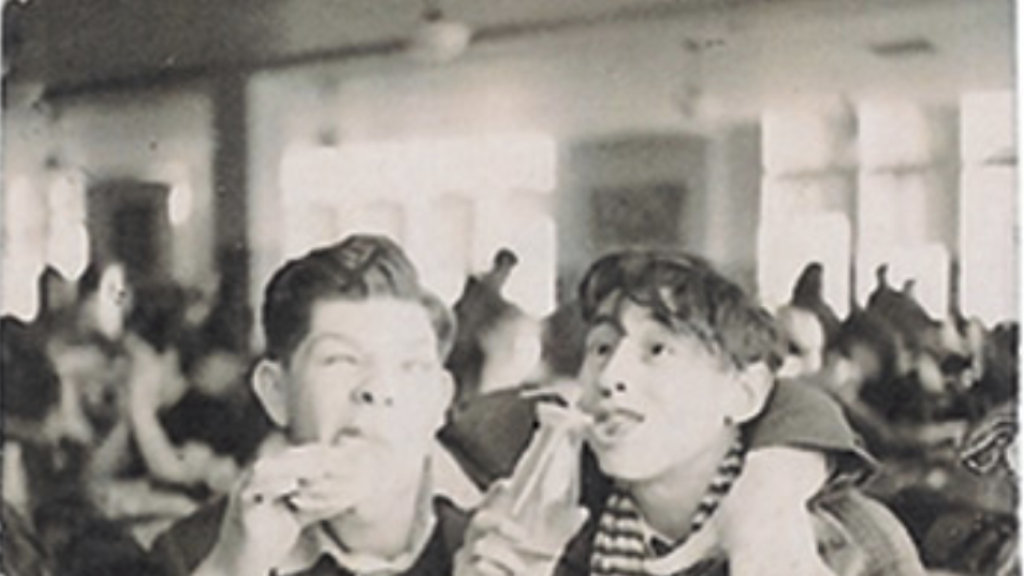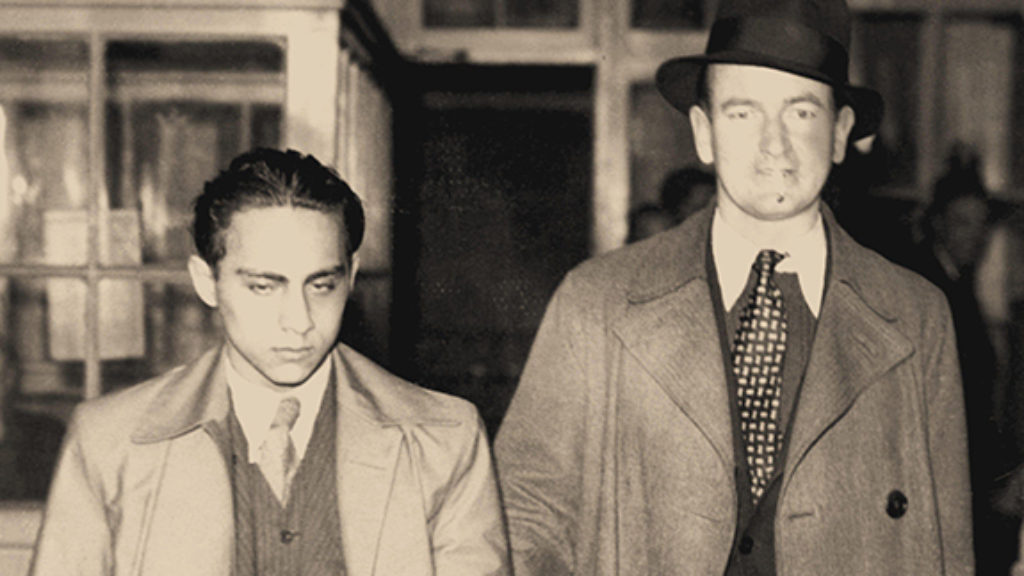The Genius of Bernard-Henri Lévy
The French have called Bernard-Henri Lévy simply by his initials, BHL, since the 1970s. They also call him a philosophe, which, even today, is no ordinary thing. In America, a philosopher is someone explaining that “Socrates is a man; all men are mortal; so Socrates is mortal” to an audience of bored 19-year-olds scrolling through their iPhones. In France, a glossy color magazine called Philosophie appears on news-stands—which France has in abundance. A philosophe is heir to the great figures of the Enlightenment, expected to be possessed of effortless learning and culture, a part of the country’s rich literary tradition, who is “engaged,” as well, in public affairs.
When BHL first appeared on the scene, more old-fashioned philosophes envied or looked down upon him for his big, broad, flexible approach to public affairs, not to mention his very public private life. To this day, BHL is as likely to appear in the glamorous pages of Paris Match as in Philosophie. In his new book, The Genius of Judaism, he recalls the lesson an old, rich, and cultivated Jew of his acquaintance once gave him about how to combat anti-Semitism: “have nicer teeth than they do; get their women to love you . . . Live in castles as big as theirs.” A promise kept.

At the prestigious École Normale Supérieure in Paris in the late sixties, Lévy studied with Derrida, Foucault, and others, imbibing the revolutionary fervor that compelled some of his fellow students to don commando uniforms and go off to East Asia. (By the time I studied at ENS, in 2011, the revolutionary students were mostly concerned with ensuring there were no cuts to France’s generous pension system—though a few, “Trumpiens-avant-Trump,” sought to disentangle France from its international treaty obligations.) In The Genius of Judaism, a work sometimes insightful, often charming, and frequently ludicrous, he states that it was in fact a fresh encounter with Judaism in these years that led him to question the Maoist politics of his peers. It was, he says, the faith of his fathers—a religion that he admits he barely knew—that taught him to question the faith in history of his contemporaries. As he puts it in one of the work’s loveliest passages: “Far from being condemned by Hegelianism, this [Jewish] people, by its existence, by its obstinacy in being, its endurance, its trial, condemns Hegelianism.”
The nouveaux philosophes, or new philosophers, among whom BHL was one of the most prominent (others included André Glucksmann and Pascal Bruckner), rejected the radicalism of elders like Jean-Paul Sartre, and preached something close to liberal sobriety and moderation. Lévy’s writings from these early years, particularly Barbarism with a Human Face and The Testament of God, are generally taken to be his most serious. In a famous public confrontation with Derrida at the end of the decade, Lévy sarcastically asked whether it was “philosophy professors who were the first to denounce the Gulag.” A confrontation followed and, by his own account, BHL was thrown out of the hall onto the Rue de la Sorbonne.
In more recent years, BHL has thrown in his lot with human rights, or “engagement with the other,” which he derives, at least in part, from another French Jewish thinker-philosopher, Emmanuel Levinas:
Well, here it comes, that ethic, announcing itself, filling itself in, revealing itself like heat-sensitive ink, except that in this case it is the heat of the concept, drawn from Levinas, of a subject obligated to the Other, shaped by others, one whose subjectivity takes on and retains its form only through contact with the face of the other man.
BHL’s calls for liberal internationalism and, often, liberal intervention have been, he writes, in this spirit. They have also been offered in just enough of a “Gaullist-national-interest” key to make them palatable at home, at least until recently. Even when traveling to global hot spots, BHL has never donned the guerilla uniform. He prefers his trademark Charvet white shirt, unbuttoned lower than the spirit, if not the letter, of Jewish law would permit.
In the 1990s he traveled to Bosnia. Recently it has been Ukraine, where he advocated for the anti-Russian side while urging Ukrainians to acknowledge their part in the atrocities of World War II. And, of course, there is the part he played in the intervention in Libya, a story well-documented, particularly by him. While his role in the Franco-British decision to help topple Gaddafi was perhaps not as central as he himself claimed, it was significant. After plunging into Benghazi in March 2011, at the height of the Libyan revolution, he returned to France with a delegation of rebel leaders to meet with President Sarkozy (and Secretary of State Hillary Clinton, who was in Paris at the time). Both the rebel leaders, in their meeting with the president, and Lévy (on the radio), urged Sarkozy to take military action. When Sarkozy decided to take their advice, he called BHL before he announced it at the UN.
Lévy’s support for Israel has been entirely in keeping with his liberal internationalism. If you ask him about the Israeli-Arab conflict, he’ll say that he supports two states for two peoples, opposes the settlements, and has held the same position since 1967. He devotes the first third of The Genius of Judaism to a nice, conventional defense of Israel and an attack on the reasons contemporary anti-Semites invoke to justify their passions. Fine stuff, but dated. This kind of moderate liberal, pro-Israel argumentation has been just on the boundaries of acceptability in Europe for some time now, and one wonders whether it remains viable—both politically in Europe and analytically in the Middle East.
That someone named Bernard-Henri Lévy, born in 1948, could have lived a so European life in post-war Europe is, let us hasten to say, a miracle. Nearly shattered in the Holocaust, the French Jewish community recovered mightily after the war, thanks in no small measure to an influx of French Algerian and Mizrahi Jews, including Lévy père, who made a pile in the timber industry, and his family. As has been well-documented in these pages, Jewish life in France is now in insuperable decline. Whatever the vain excesses of baby boomers like BHL, their lives were enabled by a certain underlying vitality that is now very much weakened. Have they equipped the next generation to cope with what comes next?
To read BHL is in part to read the life of BHL as told by BHL. The Genius of Judaism, very well translated by Steven B. Kennedy, is his most personal book. It attempts, in part, to reconcile his writing, politics, and activism with Judaism as he understands it. His amour propre, while immense, does not quite extend to regarding his life as exemplary in its Jewishness, nor to tying all of his political actions to Judaism. Yet the work does have an apologetic feel to it, in the religious sense of that word, and he looks for the “Jewish thread” of his life. The “genius of Judaism,” according to BHL, is its rejection of dogmatism in favor of hard thought. He goes on to claim that precisely this genius has been constitutive in the moral and literary outlook of France, even if few Frenchmen today would acknowledge its source.
Like Jonah, the Jews are called to go to the “great” city-states such as Nineveh, to open “breaches and channels through which can pass words that, once accumulated, committed to memory, and more or less aligned, will, at the end of time, add up to redemption.” BHL’s own recent interventions in the “modern Ninevehs” of Libya and Ukraine are of a piece with this open, universal, and universalizing Judaism, which is underwritten by Levinas’s imperative to take responsibility for “the other.”
Lévy freely admits that he is not the greatest knower of Jewish things. He barely knows Hebrew, though he offers a few fairly interesting readings of classic texts in the book. But he displays no knowledge of the Judaism of everyday life. His preference for a universalist Judaism is obviously not unrelated to this ignorance, and indeed lack of curiosity, about the ritual life and the practices that are observed by Jews and no others. He thus gives no further thought to how the participation in such practices might prepare the way for a certain kind of “universal though still Jewish” reflection of which he might approve. While Maimonides, whom BHL cites, sought to turn his intelligent readers to universalistic thoughts, he tried to do so through the cultivation of particular practices proper to the Jews. BHL knows nothing of this Maimonides.
What of his major historical contention? Has the genius of Judaism—and not merely individual Jews, including BHL—marked the development of France? There has been a new and revitalized focus on Jewish ideas in the formation of modern political thought and the Western democracies. The late political theorist Daniel J. Elazar, Harvard historian Eric Nelson, Rabbi Meir Soloveichik, and others have charted the influence, sometimes subtle but real, of Jewish political ideas on Anglo American republican writers in the 17th and 18th centuries. One can stipulate that there has been some important influence of the Hebrew Bible on Puritan America, as well as on John Milton and English Republicanism. How important is open to debate. But France?
BHL has three major cases for the Jewish influence on France. The first is the great medieval biblical commentator Rashi’s translation of difficult Hebrew and Aramaic terms into Old French. “Rashi’s writings,” BHL writes, “are a memorial to French at its beginnings.” While true and fascinating (it gives historians of the language a window into its use in the 11th-century Rhineland), it is also mostly irrelevant, though one understands why BHL is charmed to know that the greatest Jewish commentator was a master of vernacular French.
BHL’s second case sketches (or at least gestures at) a historical argument along Nelsonian lines by arguing that the 16th-century political thinkers known as Les Politiques, the most famous of whom was Jean Bodin, crucially drew upon the Hebrew Bible. According to BHL, Bodin in particular was influenced by his reading of the Old Testament in his attempt to articulate a republican theory of government. Unfortunately, says BHL, the protagonists of the French Revolution were intoxicated by Rome rather than Jerusalem, and the Hebraicizing tendency in French political thought disappeared in the Jacobin terror. And yet, BHL argues, this is a hidden dimension of French thought, a resource that might be recovered.
Finally, he cites Marcel Proust, as a Jewish writer. Proust’s “foreignness” (his Jewishness), BHL writes, permitted the “French language to free itself from itself” and therefore become again “the cutting-edge laboratory of intelligence.” That Proust’s Jewishness had something to do with his artistic accomplishment, no one would deny, but at this point BHL appears to be grasping at straws.
The origins of France as we know it stretch back eight hundred years, and the examples BHL cites and others he might have, while interesting, are hardly constitutive of the character of the country or its various political forms. Over those eight hundred years of an on-again off-again official presence in France, Jews have sometimes played an important role. But “Judaizing” the body politic? I certainly do not see it in the move from medieval Catholic France to modern France. Can one compare the role that Jean Bodin played in French history to that of John Milton in England? Suffice it to say that “Jewish France” is something of a stretch.
About BHL’s own activism and his “trips to Nineveh,” readers must judge for themselves. But what, really, is Jewish about BHL’s pro-Libyan “freedom fighter” activism, his pro-Ukraine work, and so on? These actions may or may not have been politically prudent, but what was Jewish about them? Does BHL’s human rights activism really look different than that of any other late-20th-century global actor who is famous for being famous—and righteous?
BHL’s life has been defined by the desire to go out amongst the nations. Many people of his generation, Jewish and Gentile, have shared that aspiration. As the more-than-human replicant says in the movie Blade Runner, he has “seen things you people wouldn’t believe.” And yet one comes away from The Genius of Judaism wishing that this gifted man had spent more time thinking about the necessary limits of the voyage rather than its possibilities.
Comments
You must log in to comment Log In
Suggested Reading
High Threshold
Visitors to the Hazon Ish's house would sometimes enter through the window; the venerable sage occasionally left home the same way. “A window,” the Hazon Ish reassuringly explained, “is in fact just a door with a high threshold.”

What . . . Him Worry?
How did Abraham Jaffee, raised in the shtetl of Zarasai, became one of MAD magazine's most prolific and recognizable cartoonists?

A “New History” and Old Facts
Fifty years after the conflict, Guy Laron’s The Six-Day War: The Breaking of the Middle East attempts to upend our understanding of the hostilities.

A Different Kind of Hero
The Nazis may have blamed Herschel Grynszpan for Kristallnacht, but he prevented them from using him in a show trial.
dovmaimon
Some Jews have had critical influence on post-war French political liberal ethos. Simone Veil supporting the abortion's legalization, Robert Badinter forbiding death's penalty, Mendes France regarding freeing Tunisia's colony. In literature and philosophy, two fields that are central to this country, France would be the same without leading Jewish French writers (Albert Cohen, Proust as mentioned, Raymond Aron,BHL, etc).
Today, the popular intellectuals who are able to defend the French identity's agenda against radical Islamism are Alain Finkielkraut and Eric Zemmour.
Indeed, Jews, despite their hard efforts to be more French than the French indigenes, have never been part of France's DNA, they are and apparently will remain in the role of the goodwill outsiders that people like to listen the advices but are not "a bone of our bones".
dovmaimon
Some Jews have had critical influence on post-war French political liberal ethos. Simone Veil supporting the abortion's legalization, Robert Badinter forbiding death's penalty, Mendes France regarding freeing Tunisia's colony. In literature and philosophy, two fields that are central to this country, France would be the same without leading Jewish French writers (Albert Cohen, Proust as mentioned, Raymond Aron,BHL, etc).
Today, the popular intellectuals who are able to defend the French identity's agenda against radical Islamism are Alain Finkielkraut and Eric Zemmour.
Indeed, Jews, despite their hard efforts to be more French than the French indigenes, have never been part of France's DNA, they are and apparently will remain in the role of the goodwill outsiders that people like to listen the advices but are not "a bone of our bones."